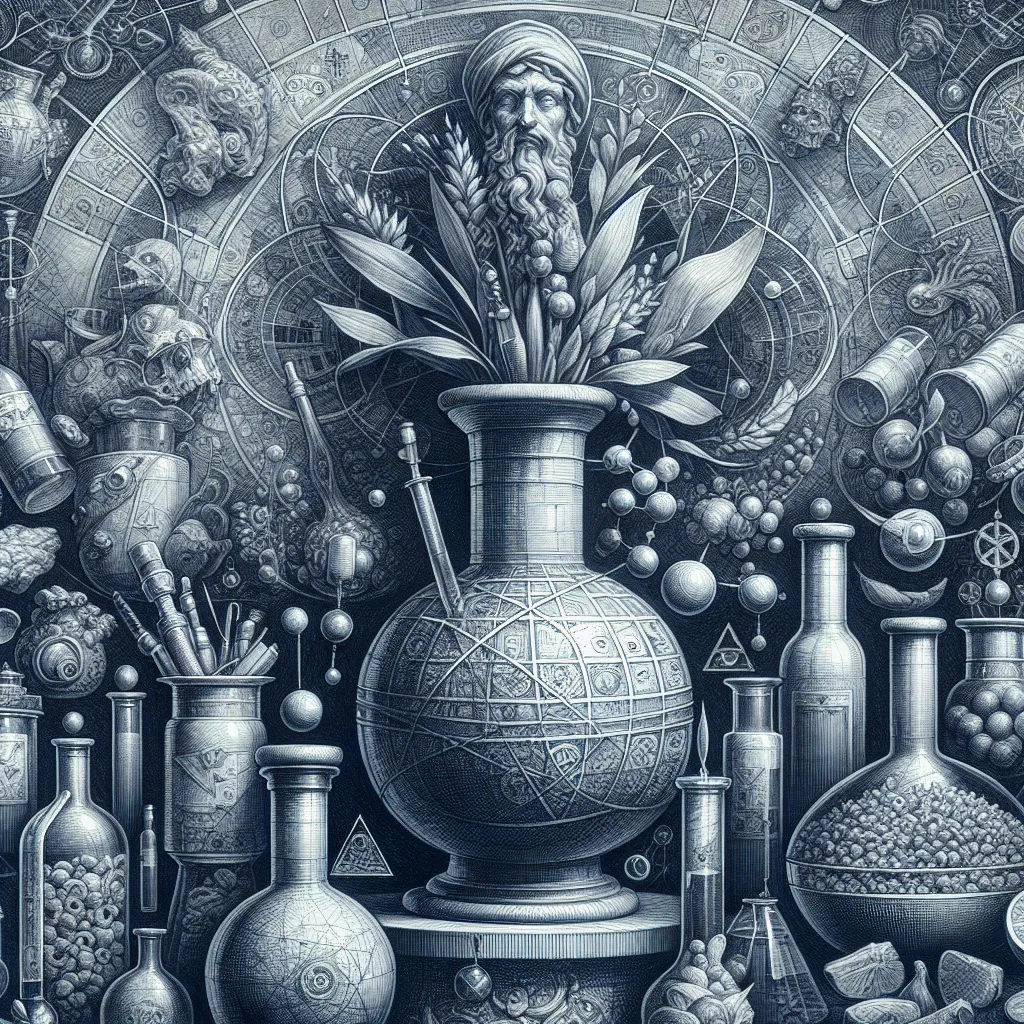
- Published on
- Authors

- Name
- You
Alchemy and Medicine: The Paracelsian Contribution
Introduction
In the enigmatic twilight of the Middle Ages and the fledgling dawn of the Renaissance, an eccentric yet profoundly impactful figure emerged on the stage of medicine and alchemy: Paracelsus. A revolutionary thinker, Paracelsus daringly diverged from traditional Galenic medicine, championing a synthesis of alchemical principles and chemical remedies. This renaissance man’s contributions have become the bedrock of modern pharmacology and highlight an intriguing confluence of mysticism and early scientific innovation.
The Alchemical Roots
Alchemy, often relegated to the shadows of occultism and pseudoscience, was in fact a sophisticated proto-science aimed at purifying, maturing, and perfecting certain materials. Paracelsus, born Theophrastus Bombastus von Hohenheim, delved into alchemy not for the transmutation of base metals into gold but for the transmutation of the human body from a state of disease to health.
Table 1: Core Alchemical Concepts Embraced by Paracelsus
| Concept | Description |
|---|---|
| Prima Materia | The primal matter from which all things originate and to which all things return, representing potential. |
| Philosophers Stone | Symbolic of the process of perfection and enlightenment, misunderstood as materialistic gold-making. |
| Mercury, Sulfur, Salt | The tria prima or three primes, considered by Paracelsus to be the essential compounds of all matter including health and disease. |
Chemical Remedies: A Paradigm Shift
While Paracelsus appreciated classical elements, his enduring legacy lies within his advocacy for the use of chemical substances in medicine. In a time when botanical concoctions dominated, Paracelsus introduced and utilized minerals and metals with unprecedented success.
Key Innovations by Paracelsus
- iatrochemistry: Paracelsus founded the field of iatrochemistry, combining chemistry and medicine. He postulated that bodily functions are governed by chemical processes, a radical departure from humoral theory.
- Specific Remedies: He rejected the notion of universal treatments and instead prescribed specific substances for specific illnesses, echoing principles of modern pharmacology.
- Doctrine of Signatures: This mystical principle suggested that the appearance of a plant indicated its healing properties, guiding Paracelsus in his compound development.
Table 2: Notable Paracelsian Remedies and Their Modern Counterparts
| Paracelsian Remedy | Intended Use | Modern Day Counterpart |
|---|---|---|
| Laudanum (Opium Tincture) | Pain relief and sedation | Morphine, Codeine |
| Mercurial Ointment | Treatment for syphilis | Antimicrobials such as Penicillin |
| Antimonials | Treatment for fever and various ailments | Modern-day antiprotozoals and treatments for parasitic infections |
The Mystical and the Scientific
Paracelsus didn't merely treat the body; he ventured into the metaphysical, viewing disease as a manifestation of spiritual or astral imbalances. This holistic view resonated with mystical traditions but aligned surprisingly well with burgeoning scientific perspectives.
Paracelsian Philosophy
- Microcosm and Macrocosm: The belief that humans (microcosm) reflect the Universe (macrocosm) in a delicate balance. Health mirrored cosmic harmony.
- Vis Medicatrix Naturae: Paracelsus emphasized the body's intrinsic ability to heal itself, guided by the vital force or spiritus vitae.
- Spagyrics: This alchemical process involved the purification and recombination of substances to extract their quintessence, which Paracelsus applied rigorously in his medicinal practices.
Diagram 1: Paracelsian Medical Model
Caption: The intricate relationship between the elements, the tria prima, and the human body in Paracelsian thought.
Conclusion
Paracelsus remains an enigmatic bridge between the mystical and the empirical, a pioneering thinker who pushed the boundaries of medicine through alchemical insight and chemical innovation. His contributions laid vital groundwork, influencing the trajectory of medical science and pharmacology profoundly.
As we navigate the celestial labyrinth of both the inner human world and the outer universe, embracing the synergy of mysticism and science continues to illuminate the path toward healing and enlightenment.
Dive deeper, explore more, and let the spirit of Paracelsus ignite your journey through the alchemical transformation of knowledge and health.
For further reading and a deeper dive into the fascinating life and contributions of Paracelsus, check out these references:
- "Paracelsus: Alchemical Medicine" by Nicholas Goodrick-Clarke
- "The Life and Work of Paracelsus" by Sydney H. Aufrère
